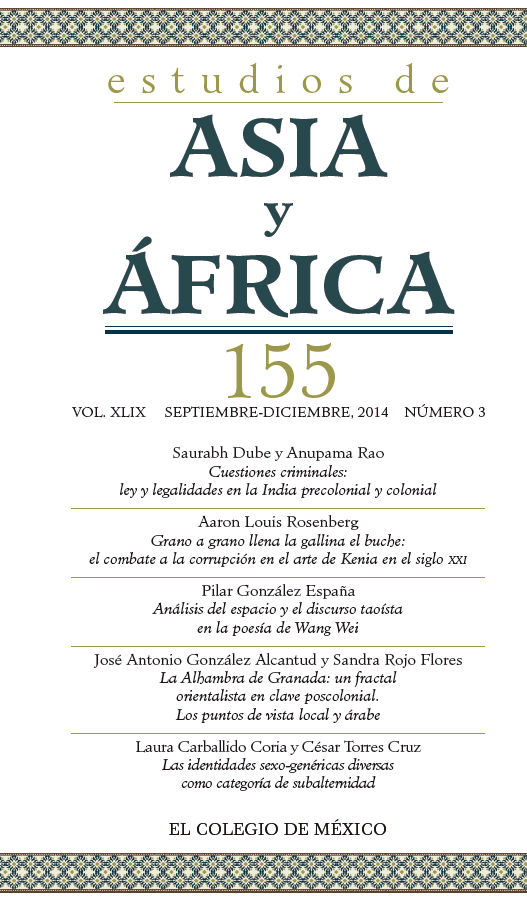Abstract
The impact and the importance of Buddhism in the Literature of the Tang Dynasty came to overshadow other philosophical and religious trends considered genuinely Chinese such as Taoism and Confucianism. Wang Wei, one of the most representative poets of his time, is a good example of syncretism and cohabitation between religions in both his life and work. The analysis of two poems by Wang Wei, mainly Taoist-inspired, demonstrate how Taoist speech and the Taoist idea of landscape were literarily, aesthetically and spiritually, perfectly configured and offer, therefore, the keys that characterize them.References
Allan, Sarah, The Way of Water and Sprouts of Virtue, Albany, State University of New York Press, 1997.
Benn, C., “Religious Aspects of Emperor Hsuen-tsung (Xuanzong) Taoist Ideologie”, en D. W. Chapell (ed.), Buddhist and Taoist Practice in Medieval Chinese Society, Buddhist and Taoist Studies, II, Hawái, University of Hawaii Press, 1987, pp. 127-146.
Cao Zhongfu 槽中孚 (ed.), Wang Wei quanji 王维全集 [Obra poética completa de Wang Wei], Shanghái, Shanghai guji chubanshe, 1997.
Cheng, Anne, Historia del pensamiento chino, Barcelona, Bellaterra.
Chevalier, Jean, Diccionario de los símbolos, Barcelona, Herder, 1986.
Chevalier, Jean y Alain Gheerbrant, Diccionario de los símbolos, Barcelona, Herder, 1995.
Cirlot, Juan Eduardo, Diccionario de símbolos, Barcelona, labor, 1985.
Gushiha 古诗海 [Enciclopedia de la poesía clásica], vol. 1, Shanghái, Shanghai guji chubanshe, 1992.
Huainanzi 淮南子, ed. Zhuzi jicheng, Hong Kong, Zhonghua shuju, 1978.
Jaegger, Georgette, Les lettrés chinois, les poètes Tang et leur Milieu, Neuchâtel, A la Baconnière, 1977.
Lao-Tse, Tao Te Ching, tr. Carmelo Elorduy, Madrid, Tecnos, 1996.
Les Grandes traités du Huainan Zi, París, Institut Ricci-Cerf, 1993.
Liu Xu 劉昫 et al. (eds.), Jiu Tang shu 舊唐書, Beijing, Zhonghua shuju, 1975.
Masperó, Henri, El taoísmo y las religiones chinas, Madrid, Trotta, 1999.
Munro, Donald J., Individualism and Holism: Studies in Confucian and Taoist Values, Ann Arbor, University of Michigan, 1985.
Nakamura, Hajime, “individualism”, en H. Nakamura, Ways of Thinking of Eastern Peoples: India, China, Tibet, Japan, Honolulú, University of Hawaii Press, 1968, pp. 247-258.
Ouyuang Xiu 歐陽修 et al. (eds.), Xin Tang Shu 新唐書, Beijing, Zhonghua shuju, 1975.
Robinet, Isabelle, Histoire du Taoïsme, des origines au XIV siécle, París, Éditions du Cerf, 1991.
Robinet, Isabelle, Lao Zi y el Tao, Palma de Mallorca, La Aventura Interior, 1999, pp. 67-68.
Tang shi yuyuan yanjiu 唐诗语言研究 [Investigaciones lingüísticas sobre la poesía Tang], Beijing, Zhongzhou guji chubanshe, 1990.
The Songs of the South, tr. David Hawkes, Londres, Penguin Books, 1985.
Tournier, M. L., L’imaginaire et la symbolique dans la Chine ancienne, París, L’Harmattan, 1991.
Wagner, Marsha Lynn, “The Art of Wang Wei’s Poetry”, tesis de doctorado, Berkeley, University of California, 1975.
Wang Wei, Paysages: Miroirs du coeur, París, Gallimard, 1990.
Wang Wei, Poemas del río Wang, tr. Pilar González España, Madrid, Trotta, 2004.
Wang Wei, La montaña vacía, Madrid, Hiperión, 2004.
Watts, Allan, Tao: The Watercourse Way, Harmondworth, Penguin, 1975.
Wu, J., The Four Season of Tang Poetry, Rutland VT, Tuttle, 1972.
Yu, Paulina, The Reading of Imagery in the Chinese Poetic Tradition, Princeton, Princeton University Press, 1987.
This work is licensed under a Creative Commons Attribution-NonCommercial-NoDerivatives 4.0 International License
Copyright 2022 Estudios de Asia y África


